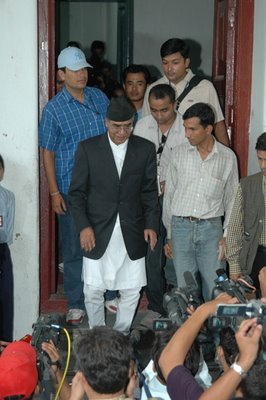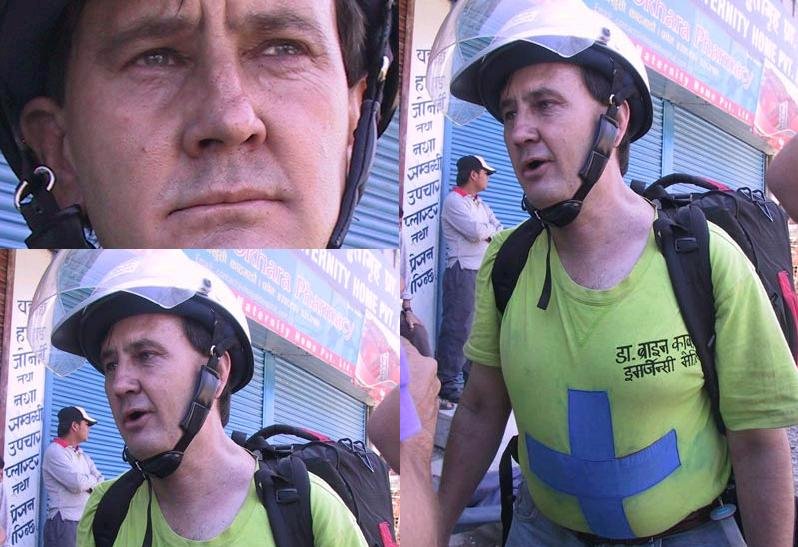

An open letter to Mr. Sher Bahadur Deuba
Hello Mr. Deuba,
Jaya Ganatantra
Mr. Deuba, I tell you the truth that you are an enemy of Democracy. You are another Gyanendra Shah. Why do you oppose to remove King from Army’s Commander-in-Chief? It’s that the
Mr. Deuba, the return to the status quo that existed four years ago is not what millions of demonstrators called for. In fact, it runs contrary to the determination to immediately end the monarchy once and for all that most observers agree has been the driving force behind the mass movement.
There can be little doubt that the king’s announcement and its acceptance was the doing of the
Now you are trying to save this evil King. The previous attempt to save the king came on 21 April, as the mounting tide against the monarchy tottered the throne. Gyanendra offered to allow the seven-party alliance to nominate a prime minister. That proposal would have changed nothing.
For the last two and a half centuries and even since
Mr. Deuba, beware that the
Mr. Deuba I am telling you that this diplomatic intervention came with a threat that has been unspoken so far, but which all concerned knows is very real: military intervention. This is why the king and his big power backers had to come up with something else to tempt the seven parties into betraying the hopes of millions of Nepalis and splitting with the Maoists. The American government’s “salute to the people of
Mr. Deuba what happened in 1980, history is crystal clear, faced with an anti-monarchist mass upsurge; the palace diverted it by staging a referendum on the king’s powers. Gyanendra, then a young prince, blatantly organized a fraudulent vote count. The seven parties, however, accepted the results. This is an historical example to keep in mind when the parties and Gyanendra talk about holding another referendum. Nor should the talk of coming up with a new constitution under the continuation of the old regime be given much credit. Gyanendra never let the constitution adopted in 1990 tie his hands too much. After he sacked parliament the last time, he chose you twice as the PM and sacked you twice as well, sent you to jail, he justified his refusal to reinstate it with the excuse that its term under the constitution had expired. Now he has just as autocratically reinstated the parliament elected seven years ago and it’s prime minister, unconcerned with constitutional niceties.
Mr. Deuba, we the people, made an agreement around a common program calling for the end of the monarchy, a constituent assembly and a new constitution for a democratic republic. If you don’t want to join our campaign, that’s ok but don’t advocate Monarchy now on. If the parties or democratic leaders make a deal with the king now, we will march against them. We don’t want a monarchy now. We warn you Mr. Deuba, not to betray our demand of Republic Nepal.
We all know that the US,
The imperialists and
But whatever happens next, what the
Mr. Deuba, if you are a real politician of 21st century, then you should know that the upcoming new democratic state is not the parliamentary system as of before February 1 [2005] and October 4 [2002], but a forward-looking multiparty democratic republic with qualities that ensure wide participation of poor peasants and workers in the state power, autonomous rule for the oppressed nationalities, regions and Madhesi people [a particularly downtrodden nationality from the eastern Terai plains region along the Indian border], along with the right to self-determination, special privileges to women and dalits [so-called ‘untouchables’], the fundamental right of all to education, health care and employment, redistribution of the land based on ‘land to the tiller’ by ending feudal land relations, the development of a national industry and a self-reliant economy, etc.
Mr. Deuba, you know what
Lastly, Mr. Deuba, to bring it to completion requires establishment of new democracy, shattering the old state and building a new one where the government is by the people and for the people i.e. people’s rule. This kind of radical change is what the
Thank you and this is my last sentence writing about you. I will not waste my time any more thinking about you and your deeds. It’s not worth.
Sincerely,
Somnath Ghimire
May 16, 2006
Somnath Ghimire: King G Is Pinochet
Somnath Ghimire On Leadership Crisis In Nepali Congress
Deuba Off To DC
Deuba In Jackson Heights
Deuba At Hotel Pennsylvania
Deuba At Columbia
Deuba, Abused
March 22 Event, Deuba In New York
Deuba Is Not Going Down
Deuba: The Common Sense Meter
Scapegoating Deuba Shows King's Desperation
Girija, Deuba, And The Rest Of Them Clowns
Email From Arzu Rana Deuba
Gagan Thapa Arrested, Deuba Re-Arrested
'Khabardar' (Warning): A Street Drama Overwhelms Thousands
Plays, dramas and skit have always come to the aid when it comes to delivering messages of social concern. Whether it is condemning the evil practices like caste discrimination, drug abuses or urging people to educate themselves, theatre or rather street play (also called 'Sadak natak') has been a powerful tool to spread awareness and educate people.
A street play called 'Khabardar' or 'Warning' was organized by a troupe of ten artists in the different alley and streets of Kathmandu from 10 th to 14 th April 2006 to caution leaders associated with the seven party alliances to uphold the rights of people and to work selflessly for fulfilling the political aspirations of people. The drama was written by Ms Maya Mitu Neupane and directed by Mr Bhupendra Timsena. The artists of this play included students from various colleges of Kathmandu. They launched the Street Play in different streets of Kathmandu, Lalitpur and Bhaktapur. This play was organized in co-ordination with Collective Campaign for Peace-COCAP, Campaign for Change-CCN, Youth Action Nepal and Human Rights Education Club-HRERLIC-Kathmandu. COCAP monitoring team closely monitored the performances by these young aspiring artists and its success in reaching out to people and inspiring and spreading messages of political concern.
The theme of the play is based on the recent historic people's movement. The total duration of the play is for 22-25 minutes. The narration of the play is written for the audience of the street and people who had made significant contribution in the people's movement. The movement is an archetype in the history of non-violence and peaceful movement. The movement which lasted for nineteen long days from 6 th April to 24th April 2006 against the direct and illegitimate rule of royal regime was successful in toppling King Gyanendra's autocratic rule and reinstatement of dissolved House of Parliament. People of Nepal walked out to streets demanding holding election for constituent assembly with the formation of interim government and finally to work towards the formation of a Republican State. However, the leaders associated with the political parties who organized the nationwide general strike with the support of the Maoist began to show their true colors by having cold war for cabinet ministry. They sidelined the interests of the general public and were more interested in fulfilling their own interests. The prime objective of this street drama is to warn the chair loving politicians to shed their personal interest and work for the betterment of Nepalese society. The theme of the play is written with the addition of humor and satire to make it lively, sensitive and audience friendly. The play also conveyed the message that if the present government fails to fulfill the aspiration of people, Nepalese people are ready to launch another movement bypassing present political leadership.
The street play troupe consisted of ten artists who had actively and intensely participated in the people's movement. The most important points which the troupe took into consideration for staging the show were to maximize audiences by the selection of a convenient time, a relatively quiet area where people can sit and relax. Another important aspect is language. The script of the play was written as far as possible in a simple and easy language so that it would be understandable to everyone.
The street drama was a grand success. The script of the play was so touchy that it literally made many people burst into tears. The Drama drew attention of large crowd of people and was really successful in conveying their messages and politically inspiring and motivating people. The first show was staged in Maidevi followed by New Banewhwor, Ratna Park, Basantapur Dabali, Bhaktapur Durbar Square, Koteshwor, Jawalakhel, Chabhail, Gongobhu, Kritipur and Kalanki. There was a very good coverage of play by the media and hope the message of warning reached the politicians and they work sincerely to fulfill people's mandate of Republican Nepal with inclusion democracy.
The pro-democracy movement which had an overwhelming participation of youths clearly indicates that the youths of Nepal are politically conscious and are ready to lead the nation under their active leadership. Time and again, it has been proved that Youths are the vehicles of change in every society across the globe.
______________________________
Glimpses of Street Drama, 'Khabardar'(Warning)
